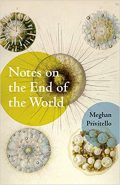
Review: Notes on the End of the World by Meghan Privitello
Reviewed by Paul David Adkins

Notes on the End of the World
Poems by Meghan Privitello
Black Lawrence Press, 2016
$8.95, 34 pp.
978-1625579621
In Meghan Privitello’s chapbook Notes on the End of the World, language wavers, borders dissolve, and people shift in and out of common forms, recognizable then grotesque. Each poem is akin to the speaker’s dream journal, a series of visions that capture modern-day dissonance and confusion in a land of shapeshifters and monstrous creatures.
Privitello’s collection consists of 22 poems, 20 of which are entitled “Day 1” through “Day 20.” At first look, the “Day” poems seem to appear chronologically in a countdown to an apocalyptic event. But the speaker is chronicling something more significant here: the dissolution of time and human perceptions as the planet wavers and collapses. Whereas dreams normally populate nighttime sleep, these visions occur during what the author calls “days,” implying daylight hours. Consequently, the speaker’s fundamental life cycles stand reversed, belying a breakdown in reality.
The opening poem, one of two title pieces which bracket the collection, records an intimate encounter between strangers. People willingly coupling with nameless lovers is not itself a signal event. However, the speaker observes, “Cold rainy days say Do it, lie in bed with a stranger. / Even if a house is on fire, and a dog is inside burning, do not leave.” The days attain voices. As the collection advances, the reader can discern these voices dispassionately commenting on the transformation of their surroundings. The speaker observes in the third section of the opening poem, “A family has taken over my house. / They could be wolves or Smiths or a tight swarm of bees.” In the same poem, the speaker states, “The hives are closing their doors. / The neighborhoods are liquidating,” as the line between human and animal begins to blur. From the onset, the images are nightmare-like, running contrary to everyday sensibilities and norms.
Despite the unsettling subject matter, Privitello’s reporter details her visions in measured tones similar to those found in Julie Bruck’s Monkey Ranch. Most of Privitello’s periods appear at the end of lines. Therefore, when she concludes her sentences in the middle of lines, these closing words, such as bloodwork, bury, suffering, red, world, bed, smoke, and God, give the speaker further pause as she relates her nightmares to her audience.
Many poems contain almost phantasmagorical shifts in imagery, as displayed in “Day 1:” “. . . one of the pigs begins to look like a man. / When it asks to cross me I don’t know whether to marry it / or cook it.” Later, in “Day 3,” the speaker interacts telepathically with a coyote, observing, “At the same time, we imagine / a dog carcass in the yard. / / He eats its organs as I curl up behind it, / my bloody fingers combing its hair.” These sinister, human-animal interactions occur throughout the sequence.
As the chapbook progresses, fear dominates. “Day 10” underscores the breakdown of boundaries between time and space: “its labyrinthine walls crumble. / It becomes limitless, navigable space.” In “Day 11,” the speaker confesses, while searching for a loved one, “Chances are I will never find you.” She continues the theme of fright and uncertainty in “Day 13” as she speculates, “For all I know, my family could have boarded a bus / and driven in reverse to a crumbling temple [.]” The concept of fear naturally disintegrates boundaries, and the landscape in Notes is no exception. Poems “Day 14,” “Day 15,” and “Day 16” all skew reality with lines such as “I am part mountain, / part ocean” and “The funhouse distorts nothing. / We are that contorted. / That backward / and forward.” Language itself collapses in “Day 19:” “I am tired of not knowing how to tell anyone / about my body and what it wants.” On “Day 20,” the speaker looks back, stating, “As the end comes, I look for everything / I’ve lost [.]”
As fear ascends in Privitello’s landscape, the chapbook closes where it begins: with a rainy day. “This is either how it begins or how it ends,” the speaker observes. The collection could, frighteningly, return to its opening, as Weldon Kees wrote in his hallmark poem “Robinson,” “The nightmare chase well under way.” In this most uncertain and dynamic political climate, Privitello’s warnings about how fear dominates us become so relevant. Every day becomes a confounding blur of images, every night a flare of fire in the rain.
Paul David Adkins lives in Watertown, NY. In May, 2018, Lit Riot Press will publish his double collection Mortis Dogs. Journal appearances include Pleiades, River Styx, Rattle, Diode, Baltimore Review, and Whiskey Island. He has received five Pushcart Prize nominations and two finalist nominations for poetry from the Central NY Book Awards program.

Leave a Reply